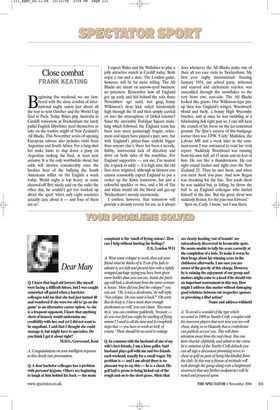Close combat
FRANK KEATING
Beginning this weekend, we are lumbered with the close combat of international rugby union just about all the way to next October and the World Cup final in Paris. Today Wales play Australia in Cardiff; tomorrow at Twickenham the lately pallid English lillywhites steel themselves to take on the sombre might of New Zealand’s All Blacks. This November series of opening European salvoes also includes visits from Argentina and South Africa. For a long-shot bet make haste to slap down a pony on Argentina making the final, at least next autumn. It is the only worthwhile shout, but odds will shorten considerably once the bookies hear of the bullying the South Americans inflict on the English a week today. World rugby is top heavy: as some cheesed-off Brit nicely said on the radio the other day, he couldn’t get too worked up about the sport ‘when only eight countries actually care about it — and four of them are us’. I expect Wales and the Wallabies to play a jolly attractive match in Cardiff today. Both enjoy a run and a dare. The London game, however, will be far more telling. The All Blacks are intent on narrow-eyed business: no prisoners. Remember how all England got up early and hid behind the sofa three Novembers ago until, last gasp, Jonny Wilkinson’s drop kick sailed handsomely high through the H and then simply carried on into the stratosphere of fabled renown? Since the inevitable Trafalgar Square mafeking which followed, the England team has been ever more posturingly fragile; retirement and injury have played a part, sure, but with England’s player-base tenfold bigger than anyone else’s, there has been a moody, flabby, introverted lack of direction and drive on both sides of the touchline. For England supporters — not me, I’m neutral (he is quick to add) — it is high time the old fires were reignited, although in fairness you cannot reasonably expect England to put a rocket up the Kiwis tomorrow, but just a colourful sparkler or two, and a bit of fizz and whizz would stir the blood and gee-up Twickenham’s morale enormously.
I confess, however, that tomorrow will provide a dreamy reverie for me, as it always does whenever the All Blacks make one of their all too rare visits to Twickenham. My first ever rugby international: freezing January 1954, our school party, mittened and scarved and excitement red-hot, was crocodiled through the snowflakes to the very front row, east-side. The All Blacks looked like giants. Our Wilkinson-type pinup then was England’s winger, Woodward, blond and burly, a bonny High Wycombe butcher, and at once he was rumbling at a fulminating lick right past us; I can still hear the crunch of his boots on the ice-armoured ground. The Spec’s curator of this backpage corner then was J.P.W. ‘Curly’ Mallalieu, the Labour MP, and a week later in the common-room I was entranced to read his vivid report: ‘Suddenly Woodward was running from his own half, all 15 stone and six feet of him. He ran like a thunderstorm. He ran right round Jarden and right over the New Zealand 25. Then he met Scott, and when you meet Scott you pass. And now Regan was streaking for the line. Two yards short he was tackled but, in falling, he threw the ball to an England colleague who hurled himself at the line. But the great shout was suddenly frozen, for the pass was forward.’ Spot on, Curly. I know, ’cos I was there.


















































































































 Previous page
Previous page